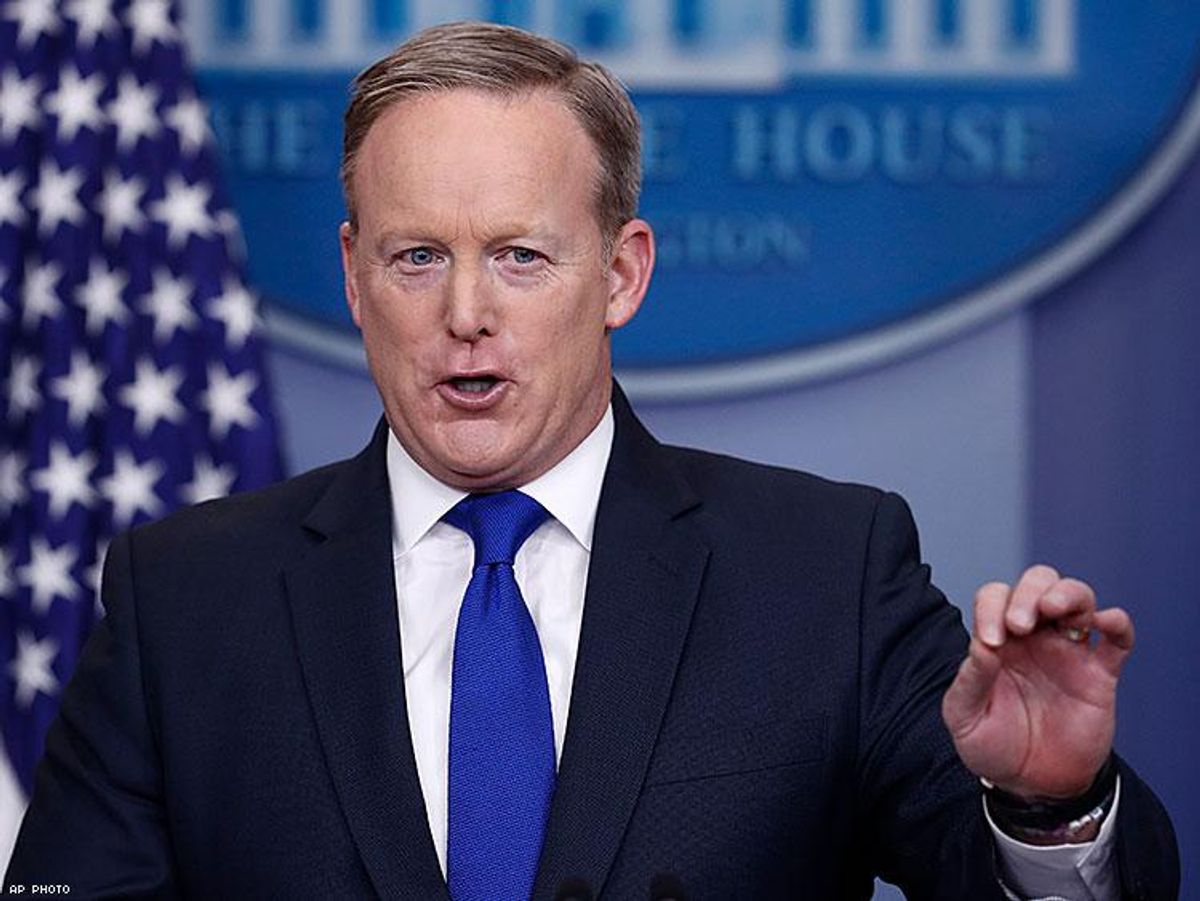Donald Trump's administration has no plans "right now" to issue an anti-LGBT "religious freedom" order, White House press secretary Sean Spicer said today, one day after a leaked draft of such an order was published in the media.
But he didn't shut the door on such an order either. "There is right now no executive orders that are official or able to read out," Spicer said at Thursday's press briefing, the Washington Blade reports. "We maintain that. There's nothing new on that front. There are a lot of ideas that are being floated out. I mentioned this the last couple days, but that doesn't mean -- part of it as the president does all the time, he asks for input, he asks for ideas, and on a variety of subjects, there are staffing procedures where people have a thought or an idea, and it goes through the process, but until the president makes up his mind and gives feedback and decides that that's final, there's nothing to announce."
The draft, first obtained by The Nation, lays out a broad set of circumstances in which businesses, nonprofits, and even government employees would be able to discriminate, without punishment, against anyone who offended their religious beliefs. "The draft order seeks to create wholesale exemptions for people and organizations who claim religious or moral objections to same-sex marriage, premarital sex, abortion, and trans identity, and it seeks to curtail women's access to contraception and abortion through the Affordable Care Act," the magazine reported. News of the draft met with outcry from numerous LGBT and civil liberties groups, while legal scholars said that enacting such a policy via executive order is likely unconstitutional.
Some LGBT organizations had predicted that Trump would announce such an order when speaking at the National Prayer Breakfast this morning. He didn't, but instead expressed support for repealing the Johnson Amendment, a provision of federal tax law that limits political activities by churches, punishing violations with loss of tax exemption.
Trump did claim that religious freedom in the U.S. and around the world is being threatened, and Spicer echoed that to a degree. The press secretary said he is concerned about the "small business owner or employee who wants to have a degree of expression of faith at the company."
"Too often those voices get pushed out in the name of political correctness," Spicer said. "So [Trump is] going to continue to make sure that we not only speak up for it but find ways in which we can keep that line a little less blurred and make sure that the pendulum doesn't swing against people."
Trump has expressed support for the proposed First Amendment Defense Act, which would enshrine such religious exemptions in federal law. During the presidential campaign, he said he would sign the act if it is passed by Congress. And Vice President Mike Pence, while governor of Indiana, signed into law a bill providing a broad license to discriminate in the name of religious freedom; after much public outcry and loss of business by the state, the legislation was amended so as to ostensibly not allow such discrimination. In the same year, 2015, Arkansas legislators passed a similar law, and similarly had to amend it.
Several other states continue to consider legislation of this type. The Virginia House of Delegates today approved a bill that would protect individuals and organizations from penalties for actions taken "in accordance with a sincerely held religious belief or moral conviction that marriage is or should be recognized as the union of one man and one woman." The bill, which now goes to the state's Senate, "could allow taxpayer-funded organizations like homeless shelters and adoption agencies to refuse service to same-sex couples, transgender people, and anyone suspected of having intimate relationships outside of a heterosexual marriage (such as single mothers or a cohabiting straight couple) without losing taxpayer funding, contracts, licensing, or other forms of state recognition," according to the Human Rights Campaign. Gov. Terry McAuliffe, a Democrat, vetoed similar legislation last year.
And the Mississippi legislature last year passed a bill much like this one and Gov. Phil Bryant signed it into law, but it was blocked by a federal court before it could go into effect. The state is appealing the ruling.


















































































